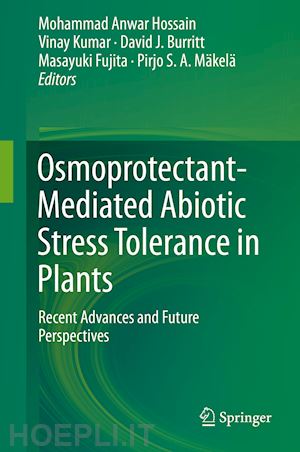
Questo prodotto usufruisce delle SPEDIZIONI GRATIS
selezionando l'opzione Corriere Veloce in fase di ordine.
Pagabile anche con Carta della cultura giovani e del merito, 18App Bonus Cultura e Carta del Docente
In nature, plants are constantly challenged by various abiotic and biotic stresses that can restrict their growth, development and yields. In the course of their evolution, plants have evolved a variety of sophisticated and efficient mechanisms to sense, respond to, and adapt to changes in the surrounding environment. A common defensive mechanism activated by plants in response to abiotic stress is the production and accumulation of compatible solutes (also called osmolytes). This include amino acids (mainly proline), amines (such as glycinebetaine and polyamines), and sugars (such as trehalose and sugar alcohols), all of which are readily soluble in water and non-toxic at high concentrations. The metabolic pathways involved in the biosynthesis and catabolism of compatible solutes, and the mechanisms that regulate their cellular concentrations and compartmentalization are well characterized in many important plant species. Numerous studies have provided evidence that enhanced accumulation of compatible solutes in plants correlates with increased resistance to abiotic stresses. New insights into the mechanisms associated with osmolyte accumulation in transgenic plants and the responses of plants to exogenous application of osmolyte, will further enhance our understanding of the mechanisms by which compatible solutes help to protect plants from damage due to abiotic stress and the potential roles compatible solutes could play in improving plants growth and development under optimal conditions for growth. Although there has been significant progress made in understanding the multiple roles of compatible solute in abiotic stress tolerance, many aspects associated with compatible solute-mediated abiotic stress responses and stress tolerance still require more research. As well as providing basic up-to-date information on the biosynthesis, compartmentalization and transport of compatible solute in plants, this book will also give insights into the direct or indirect involvement of these key compatible solutes in many important metabolic processes and physiological functions, including their antioxidant and signaling functions, and roles in modulating plant growth, development and abiotic stress tolerance.
In this book, Osmoprotectant-mediated abiotic stress tolerance in plants: recent advances and future perspectives, we present a collection of 16 chapters written by leading experts engaged with compatible solute-induced abiotic stress tolerance in plants. The main objective of this volume is to promote the important roles of these compatible solutes in plant biology, by providing an integrated and comprehensive mix of basic and advanced information for students, scholars and scientists interested in, or already engaged in, research involving osmoprotectant. Finally, this book will be a valuable resource for future environmental stress-related research, and can be considered as a textbook for graduate students and as a reference book for front-line researchers working on the relationships between osmoprotectant and abiotic stress responses and tolerance in plants.
Table of contents
Serial no. Chapter title Corresponding author’s affiliation and email
1 Osmoprotectant-related genes in plants under abiotic stress: expression dynamics, in silico genome mapping, and biotechnology
Professor Éderson Akio Kido, Department of Genetics, Federal University of Pernambuco, Recife, PE, Brazil, email: kido.ufpe@gmail.com
2 Proline metabolism and its functions in development and stress tolerance
Professor Maurizio Trovato, Department of Biology and Biotechnology, Sapienza University of Rome, Italy, email:maurizio.trovato@uniroma1.it
Professor Dietmar Funck, Department of Biology, University of Konstanz, Germany, email: dietmar.funck@uni-konstanz.de
3 Regulation of proline accumulation and its molecular and physiological functions in stress defence
Professor Giuseppe Forlani, Laboratory of Plant Physiology and Biochemistry, University of Ferrara, Italy, email: flg@unife.it
Dr. Santiago Signorelli, KU Leuven, Belgium, email: santiago.signorelli@kuleuven.be
4 Exogenous proline-mediated abiotic stress tolerance in plants: possible mechanisms Professor Pascal LABROUSSE, Université de Limoges, France, email: pascal.labrousse@unilim.fr
5 Biosynthesis and degradation of glycine betaine and its potential to control plant growth and development Dr. Elisa M. Valenzuela-Soto, Department of Food Sciences, Research Center for Food and Development A.C., Mexico, email: elisa@ciad.mx
6 Exogenous glycinebetaine-mediated modulation of abiotic stress tolerance in plants: possible mechanisms
Professor Xinghong Yang, Shandong Key Laboratory of Crop Biology, Shandong Agricultural University, Taian 271018, China, email: xhyang@sdau.edu.cn
7 Roles of endogenous glycinebetaine in plant abiotic stress responses
Professor Pirjo Mäkelä, Department of Agricultural Sciences, University of Helsinki, Finland; email: Pirjo.Makela@helsinki.fi
8 Biosynthesis and degradation of trehalose, and its potential to control
plant growth, development and (a)biotic stress tolerance Professor Patrick Van Dijck, VIB Department of Molecular Microbiology, KU Leuven Laboratory of Molecular Cell Biology, Belgium, email: patrick.vandijck@kuleuven.vib.be
9 Proline, glycinebetaine and trehalose uptake and inter-organ transport in plants under stress Professor Teruhiro Takabe ,Research Institute, Meijo University, Nagoya, 468-8502, Japan, email:takabe@meijo-u.ac.jp
10 Transgenic plants overexpressing trehalose biosynthetic genes and abiotic stress tolerance in plants Dr. Zsófia Bánfalvi, NARIC, Agricultural Biotechnology Institute, Szent-Györgyi A. u. 4., H-2100 Gödöllo, Hungary, e-mail: banfalvi.zsofia@abc.naik.hu
11 The role of proline, glycine betaine and trehalose in stress responsive gene expression Professor Melike Bor, Department of Biology, Ege University, Turky, email: melike.bor@ege.edu.tr
Dr. Joshua D. Klein,Institute for Plant Science, ARO-Volcani Center, Rishon LeZion, ISRAEL, email: vcjosh@agri.gov.il
13 Relationship between polyamines and osmoprotectants in the response to salinity of the legume-rhizobia symbiosis
Professor Miguel López-Gómez, Universidad de Granada, spain, email: mlgomez@ugr.es
14 Engineering polyamines metabolic pathways for abiotic stress tolerance in plants Dr. Susana Araújo, universidade Nova de Lisboa,Oeiras, Portugal, email: saraujo@itqb.unl.pt
15 Fructan metabolism in plant growth and development and stress tolerance
Professor Alejandro del Pozo, Universidad de Talca, Chile, email: adelpozo@utalca.cl











Il sito utilizza cookie ed altri strumenti di tracciamento che raccolgono informazioni dal dispositivo dell’utente. Oltre ai cookie tecnici ed analitici aggregati, strettamente necessari per il funzionamento di questo sito web, previo consenso dell’utente possono essere installati cookie di profilazione e marketing e cookie dei social media. Cliccando su “Accetto tutti i cookie” saranno attivate tutte le categorie di cookie. Per accettare solo deterninate categorie di cookie, cliccare invece su “Impostazioni cookie”. Chiudendo il banner o continuando a navigare saranno installati solo cookie tecnici. Per maggiori dettagli, consultare la Cookie Policy.